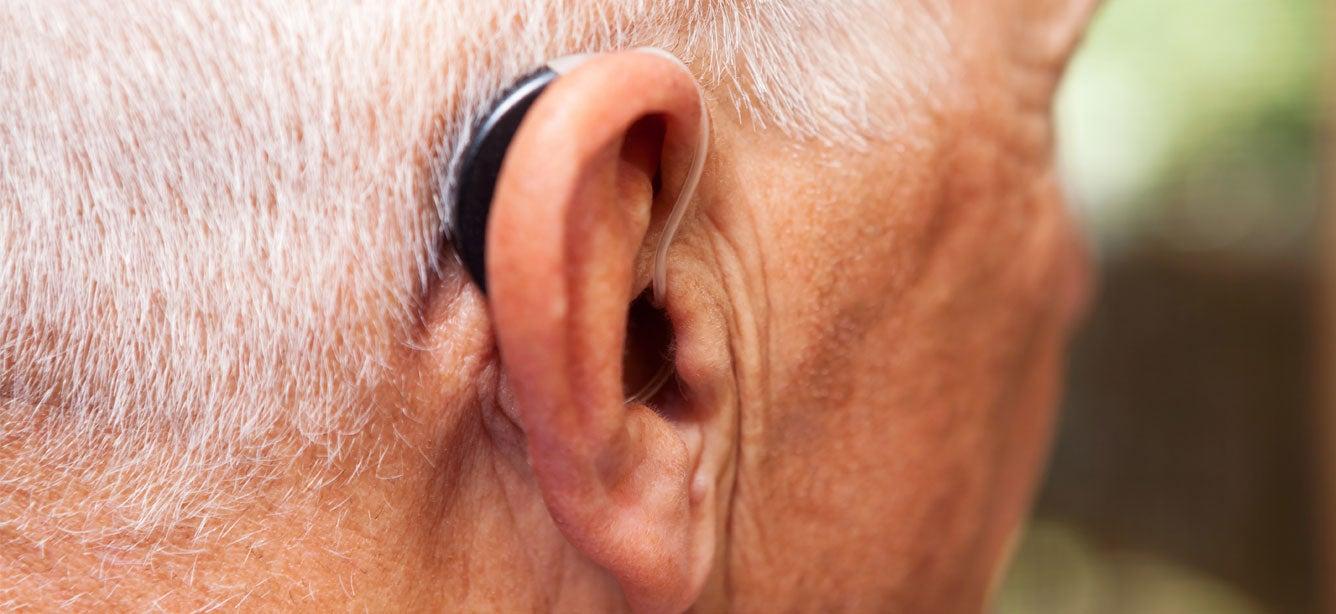Over-the-Counter Hearing Aids: What Does the FDA Rule Mean for Older Adults?
9 min read

Related Topics
The U.S. Food & Drug Administration (FDA) has approved the sale of over-the-counter (OTC) hearing aids for people with mild to moderate hearing loss (not severe hearing loss).1
The FDA’s decision is designed to ensure the safety and effectiveness of OTC and prescription hearing aids as well as increase competition in the OTC hearing aid market, and hopefully reduce the costs of hearing aids. Consumers will be able to buy hearing aids online or in brick-and-mortar retail stores such as drug stores without having to first have an audiologist provide an exam or fitting adjustment.
Are over-the-counter hearing aids safe?
The FDA’s regulations for hearing aids are good for consumers. Among the protections in the regulations:
- Out of a concern for safety, the FDA lowered the maximum volume of OTC hearing aids.
- In-the-ear OTC hearing aids must be at least 10 millimeters from the eardrum to reduce the chance that injury to the eardrum will happen.
- OTC hearing aids must have a user-friendly volume adjustment.
- Hearing aid labeling must be simplified to make it easier for consumers to understand how to use their hearing aids safely and effectively; for example, recharging batteries, controlling volume, and best ways to clean the hearing aid.
These are welcome changes and are intended to improve the safety of OTC hearing aids. Yet we recommend first visiting a general practitioner to receive the Medicare-required referral to an audiologist and then visiting an audiologist.
There are several reasons to take these steps:
- You may not need hearing aids.
- To make sure you get hearing aids that work for you. For example, your level of hearing loss may be greater than mild to moderate, in which case OTC hearing aids are not right for you.
- An audiologist can help make sure your hearing aids are safe and of high quality.
- You could save yourself time and money spent on OTC hearing aids that may not work for you.
How do I know if OTC hearing aids are right for me?
The FDA created two categories of hearing aids. The first category is for prescribed hearing aids that require professional audiology services. The second category is OTC hearing aids, some of which may not fit well in the ear. The FDA approved the sale of OTC hearing aids for people with perceived mild to moderate hearing loss. Although the FDA does not require the service of an audiologist for older adults to access these hearing aids, there are many benefits to making an audiology visit the first stop before buying OTC hearing aids.
The first step is understanding your hearing loss. An audiologist can help determine if the hearing loss requires a hearing aid. Acute hearing loss can be the result of something like an infection or a medication, which would not necessitate the use of hearing aids. You may have wax build up. Understand your hearing loss. Make sure there’s a “there there” before spending your money on OTC hearing aids.
Another reason why it’s important to first have a professional assessment and fitting is that an audiologist can help ensure you don’t harm yourself with, for instance, OTC hearing aids that malfunction or are too loud. An audiologist can also help verify your hearing aids are designed to meet your specific needs. OTC hearing aids may not target the type of sound frequency (low or high) that’s specific to your hearing loss. Also, ear canals are of varying sizes, and proper fitting is critical to getting the most out of your hearing aids. An audiologist can help ensure the hearing aids fit well.
Once you know whether your hearing loss qualifies as mild to moderate in severity and whether you’re a good candidate for OTC hearing aids, you should assess the risks of OTC hearing aids and make your own decision on whether to make a purchase. There are many benefits, like easy access, time saved, and saving money, that come along with those same risks.
How can I get help deciding on a hearing aid?
NCOA's Adviser features a best hearing aid review, providing you everything you need to know to find the right device for your needs. Our Reviews Team selected the top hearing aid choices based on features, price, fit, and more. If you're still unsure what type of hearing aid you need, be sure to speak with an audiologist or hearing aid specialist who can provide guidance.
Does Medicare cover hearing assessments or hearing aids?
Current coverage
Today, traditional Medicare doesn't pay for hearing aids or audiology services. Some Medicare Advantage plans offer some coverage of hearing assessments and hearing aids. Medicare Advantage plans can offer additional benefits not covered by traditional Medicare. The number of Medicare Advantage plans offering some hearing benefits has been growing in recent years. From 2018 to 2020, the percentage of plans offering some type of hearing benefit increased from 83% of all Medicare Advantage plans to 93%.2
Future additional coverage
Medicare’s operators finalized a proposal to make it easier to access audiology services starting in January 2023. The change removed the requirement that Medicare patients must first see their general practitioner before seeing an audiologist. Instead, the proposal allows older adults with longer-term (indirectly defined as lasting more than six months) hearing issues not have to first receive a general practitioner referral. In other words, this could save Medicare beneficiaries time and perhaps money.
In 2021, the U.S. House of Representatives passed legislation providing traditional Medicare coverage for hearing aids and audiology services for beneficiaries with severe hearing loss, but the Senate did not follow suit. Any future hearing benefit covered by traditional Medicare would also then have to be covered by Medicare Advantage. NCOA continues to advocate for Medicare coverage for hearing aid benefits.
How can I find help paying for hearing aids?
If you are a veteran, check with the Veterans Administration on the hearing benefits they provide.
Several charitable foundations and other resources may also be available to help you pay for hearing aids:
- Sertoma is a civic service organization that helps connect people with hearing assistance and offers a comprehensive listing of national and state charitable programs, organized by state.
- Help America Hear is an assistance program from the Foundation for Sight and Sound providing new hearing aids for low-income individuals.
- The Hearing Industries Association maintains a Guide to Financial Assistance for Hearing Aids. The association also recommends negotiating on the price of hearing aids.
- The Hearing Loss Association of America offers guidance on its Financial Assistance webpage.
- Some local Lions Clubs run projects which distribute affordable hearing aids to those in need. Contact your local chapter to see if it offers the program.
Why are hearing aids important for older adult health?
Hearing loss is a sudden or gradual decrease in how well you can hear and is one of the most common conditions affecting older adults. About 30 million adults in the U.S. could benefit from the use of hearing aids.3 Approximately one in three people between the ages of 65 and 74 has hearing loss, and nearly half of those older than 75 have difficulty hearing.4
Living well with hearing loss is challenged by stigmas associated with wearing hearing aids. One study of attitudes among adults working in the education industry associated wearing hearing aids with aging, intellectual slowness, and communication challenges. This stigma around hearing loss can be directed outwardly as well as inwardly. For example, the stigma associated with hearing loss can by itself affect self-esteem and undermine feelings of self-worth and ability to do the things you want to do. Some older adults with hearing loss may limit their activities, which can lead to problems such as depression and isolation.
The Hearing Loss Association of America’s Executive Director Barbara Kelley points out that some older adults fear hearing aids make them look older, but also provides this colorful take:
It’s not going to make you look old,” she said. What’s going to make you look old is constantly getting it wrong, asking for things to be repeated. You know, wearing a hearing aid is much better than that."
We encourage older adults to think of hearing aids, so many of which are almost invisible to those we interact with, as a tool like any other. Eyeglasses, bicycles, automobiles, and hearing aids are all tools that make life easier and enrich our lives. With hearing aids, older adults can more easily participate in activities they may otherwise have missed out on. Aging and living well with hearing loss can bring many wonderful things such as more time conversing with friends and family after retirement and more free time to devote to hobbies like listening to music, participating in a choir, or listening to audio from a TV baseball game.
Hearing loss can impact mental health and make it harder to understand and follow a doctor's advice, respond to warnings, and hear doorbells and alarms. Hearing loss also makes it harder to participate in conversations with friends and family and enjoy entertainment like movies and concerts.5 the impact of hearing loss can be frustrating, embarrassing, and even dangerous.6 Hearing loss has also been associated with higher rates of falls, dementia, depression, social isolation and higher health care spending, such as more hospitalizations among older adults.7
Like other technology you use daily, an upfront investment is required, so to demonstrate the true value, consider the cost per day over the life of the hearing aid, usually five years. For a few dollars a day, you can stay connected and engaged. The investment in your hearing could even benefit your budget in the future since untreated hearing loss is associated with 46% higher total health care costs over a 10-year period.
Sources
1. Federal Register. Aug. 17, 2022. Found on the internet at https://www.federalregister.gov/documents/2022/08/17/2022-17230/medical-devices-ear-nose-and-throat-devices-establishing-over-the-counter-hearing-aids
2. The Commonwealth Fund. Medicare Advantage Plans Offering Expanded Supplemental Benefits: A Look at Availability and Enrollment. Feb. 10, 2021. Found on the internet at https://www.commonwealthfund.org/publications/issue-briefs/2021/feb/medicare-advantage-plans-supplemental-benefits
3. National Institute on Deafness and Other Communication Disorders. Quick Statistics about Hearing. Found on the internet at https://www.nidcd.nih.gov/health/statistics/quick-statistics-hearing
4. National Institute on Aging. Hearing Loss: A Common Problem for Older Adults. Found on the internet at https://www.nia.nih.gov/health/hearing-loss-common-problem-older-adults
5. Ciorba A, Bianchini C, Pelucchi S, Pastore A. The impact of hearing loss on the quality of life of elderly adults. Clin Interv Aging. 2012;7:159-63. doi: 10.2147/CIA.S26059. Epub 2012 Jun 15. Found on the internet at https://www.ncbi.nlm.nih.gov/pmc/articles/PMC3393360/
6. Johns Hopkins Bloomberg School of Public Health. Hearing Loss and the Dementia Connection. Nov. 12, 2021. Found on the internet at https://publichealth.jhu.edu/2021/hearing-loss-and-the-dementia-connection
7. Shukla A, Harper M, Pedersen E, Goman A, Suen JJ, Price C, Applebaum J, Hoyer M, Lin FR, Reed NS. Hearing Loss, Loneliness, and Social Isolation: A Systematic Review. Otolaryngol Head Neck Surg. 2020 May. Found on the internet at https://pubmed.ncbi.nlm.nih.gov/32151193/




